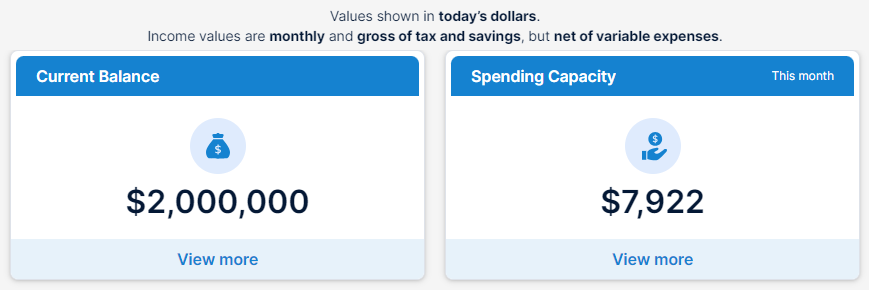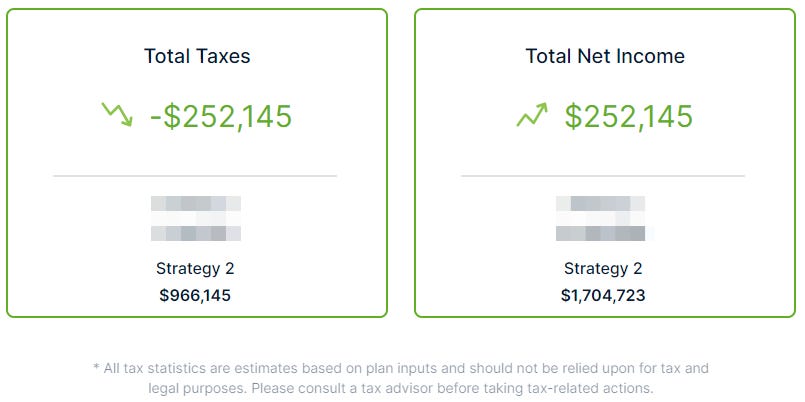Taxes and your retirement income
How much can you reliably spend after taxes have been accounted for?

Good morning,
Back in early May, I wrote this:
In the essay above I detailed the many benefits of including a taxable brokerage account as part of your retirement savings plan.
Today, I’d like to dig a little deeper into this topic and attempt to show you the impact a brokerage account can potentially have on your after-tax retirement income…
First, let me introduce you to Jane.
She’s 62 years old, has just retired, and has $2,000,000 in accumulated investments to help provide her retirement income.
To keep things simple, I’m not including any Social Security or other income sources. And we’re not including any additional assets in Jane’s plan.
And we’re assuming Jane will live to age 95.
She lives in Georgia.
I’m going to isolate the impact to Jane’s sustainable retirement income based on whether her portfolio is all in an IRA or all in a taxable brokerage account.
Let’s start with Jane’s entire $2 million portfolio in her IRA:
As you can see above, her portfolio value is $2 million and her starting monthly pre-tax income is $7,922.
But what if we look at her after-tax monthly income?
Based on the difference between Jane’s pre-tax and after-tax monthly income amount, the analysis assumes she’ll have to pay approximately $1,298 in taxes on her $7,922 gross retirement income.
She’ll get to spend $6,624 in her first month of retirement.
Now, let’s look at the same scenario, but let’s assume Jane’s entire $2 million portfolio is in a taxable brokerage account:
As expected, same pre-tax income as with the IRA example above.
But it gets more interesting when we compare the after-tax income amounts:
Note: I’m assuming the $2 million taxable brokerage account has a cost basis of $1.5 million. In other words, I’m assuming there are already $500,000 in unrealized capital gains in Jane’s portfolio.
There’s only a difference of approximately $128 between the pre- and after-tax income amounts when we assume Jane’s entire portfolio is in a taxable brokerage account.
And while it’s unlikely - though not unheard of - to have all of your long-term investments in either an IRA or a brokerage account, I just wanted to illustrate the potential impact one “tax bucket” can have relative to another.
Let’s look at it from another perspective.
Here’s the IRA scenario:
The numbers above attempt to calculate the total lifetime taxes that will be owed as well as the total lifetime after-tax income Jane could expect.
Here are the same numbers for the taxable brokerage account:
Note: Please ignore the numbers in green in the boxes above as they’re illustrating something unrelated to our discussion today.
As you can see, the taxable brokerage account scenario results in approximately $537,000 less tax paid over Jane’s lifetime. And she captures this entire tax savings in additional after-tax retirement income.
After writing this article in early May, I realized it might be more helpful to show you the potential impact of a brokerage account rather than just telling you.
A few important notes and assumptions:
The numbers above don’t capture or quantify the potential lifetime income tax savings from making pre-tax IRA or 401k contributions while you are working and accumulating a $2 million IRA account
The calculations above are based on today’s tax rates and the assumption that they will remain constant for the remainder of Jane’s life. Very unlikely.
This is not tax advice and I’m not an accountant. However, I do believe it’s important to consider the tax implications of virtually all your financial decisions. Especially when it comes to creating your retirement income plan.
The analysis above assumes you’ll gradually spend less throughout your retirement as you age (most people do) while also accounting for your healthcare expenses being higher late in life. This is sometimes referred to as the “retirement spending smile”.
As with all things financial, it’s best to strike a balance.
Save into your 401k AND start investing in a brokerage account once you can afford to do so.
And if you’re close to retirement or already retired, make the best plan with what you have.
And be sure to do some tax planning along the way.
Any questions about the above?
Any surprises or insights?
Hit reply or leave a comment and let me know.
Links & Things
While this reminds me of Morgan Housel’s article about Getting the Goalpost to Stop Moving, I encourage you to read Nick Maggiulli’s thoughts on the same idea:
And if you’re interested, here’s my August, 2022, essay along the same lines:
The dangers of "if, then..."
Thoughts? Suggestions?
Hit reply or leave a comment and share your thoughts…
Until next Wednesday,
Russ









